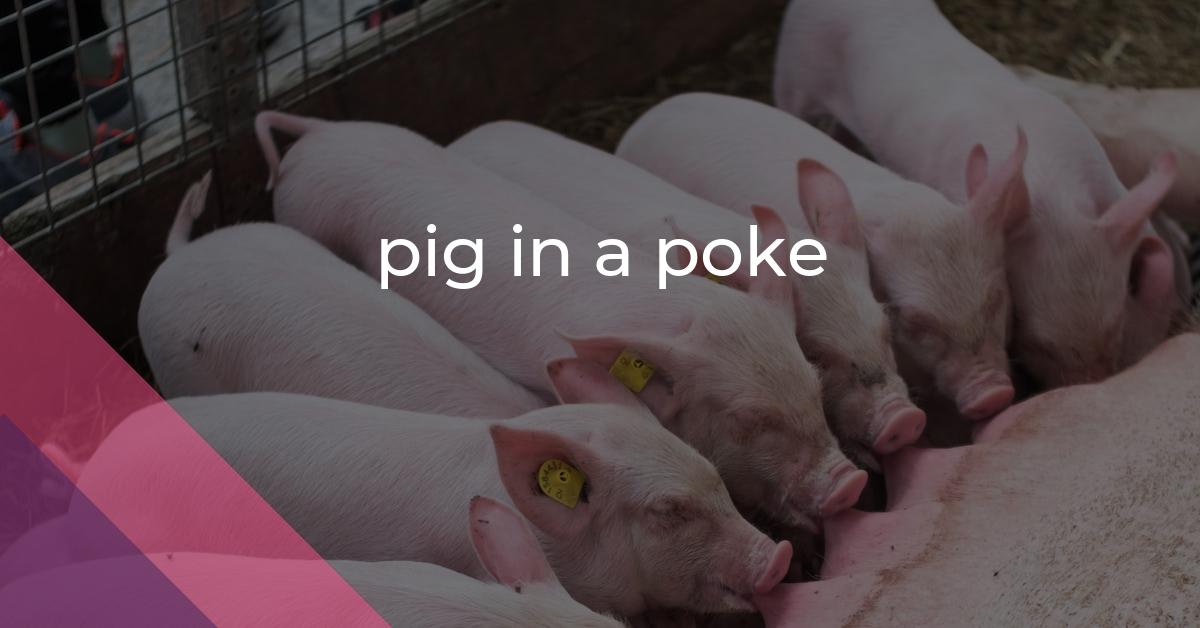pig in a poke: Idiom Meaning and Origin
What does ‘pig in a poke’ mean?
"Pig in a poke" is an idiom that means buying something without inspecting it, resulting in possible disappointment or deception.

Idiom Explorer
An idiom meaning to betray someone or deceive them dishonestly, often when they least expect it.
The idiom "ring hollow" means that something sounds insincere or not genuine, lacking in substance or meaning.
The idiom "riddle wrapped in an enigma" means something or someone that is difficult to understand or explain because of their mysterious or complex nature.
The idiom "quelle surprise" is a sarcastic remark used to express a lack of surprise or to mock something that is expected or predictable.
The idiom "put-up job" means a planned or arranged situation designed to deceive or trick someone.
The idiom "poke one's nose into" means to interfere in someone else's business or affairs without being invited or asked to do so.
The idiom "pill in the pocket" refers to having a hidden or secret plan or backup option that can be used if needed.
The idiom *pigs can fly* means that something is completely impossible. It is often used to express disbelief or to emphasize the unlikelihood of a situation or event.
Mischievous Mystery
The idiom "pig in a poke" has a long history and has been widely used in the English language. The phrase refers to purchasing something without knowing its true worth or quality. This idiom originated in medieval times and was commonly used by traders and sellers. It serves as a reminder to exercise caution and skepticism when accepting something blindly.
The phrase "pig in a poke" dates back to the 14th century and was originally used to describe a deceitful practice in the marketplace. Markets at that time were bustling with activity, and sellers would often deceive potential buyers by placing a cat or a small piglet in a bag instead of the high-value items they claimed to be selling. This deceptive practice aimed to dupe buyers into making a purchase without inspecting the goods beforehand. Opening the bag and revealing a different item would denote the deception at play.
The idiom gained popularity due to its association with this elusive practice. Over time, "pig in a poke" has come to represent any situation where a person purchases or accepts something without being fully informed about its true value, condition, or consequences.
In modern usage, "pig in a poke" is often used metaphorically to caution people against making hasty decisions or accepting something blindly. It serves as a reminder to exercise caution and skepticism, particularly when facing sales pitches or offers that seem too good to be true.
One related idiom is "cat in the sack," which carries a similar connotation of deception. Just like "pig in a poke," this idiom warns against accepting something without fully understanding or inspecting it. Both idioms highlight the importance of being well-informed and avoiding deception.
Another related idiom is "in a pig's eye." This expression is used to convey disbelief or skepticism towards something being presented. It suggests that the person using the idiom considers the claim or offer to be highly unlikely or false. "In a pig's eye" emphasizes the need to approach claims or offers with skepticism and critical thinking.
"pearls before swine" is yet another idiom related to the concept of deceiving or misjudging the value of something. This expression is often used when someone presents something valuable or of high quality to someone who does not appreciate or understand its worth. It serves as a cautionary reminder to not waste or undervalue something valuable by presenting it to someone who cannot appreciate its true value.
The last related idiom is "fool's bargain," which signifies a deal or agreement that is unfair or disadvantageous to one party involved. This idiom warns against making agreements without fully understanding the terms or potential consequences. It highlights the importance of carefully evaluating the details of any deal or agreement before committing.
Although the phrase "pig in a poke" is now more commonly used figuratively, its historical context and origin lend depth to its meaning. The idiom serves as a reminder of the age-old battle between buyers and sellers, trust and deception, and the importance of making informed decisions and maintaining a healthy skepticism.
While the phrase "pig in a poke" has a clear meaning and connotation, it also leaves room for interpretation and application in various scenarios. It has become a timeless idiom that encapsulates the cautionary tale of being aware of the potential risks associated with making uninformed decisions. In a modern world filled with countless opportunities, both genuine and deceptive, the idiom serves as a reminder to exercise due diligence and critical thinking.
Example usage
Examples of how the idiom *pig in a poke* can be used in a sentence:
- He bought that expensive jacket without trying it on first, and ended up with a pig in a poke.
- The advertisement promised high-quality products, but the customers felt like they were buying a pig in a poke when they received low-quality items.
- She signed the contract without reading it thoroughly and later realized she had agreed to a pig in a poke.
The idiom *pig in a poke* is commonly used to describe a situation where something is bought or accepted without proper inspection or scrutiny. In these examples, the idiom is used to illustrate situations where someone purchases something without fully understanding its true value or quality. It emphasizes the importance of being cautious and aware before committing to a purchase or agreement.
More "Deception" idioms



